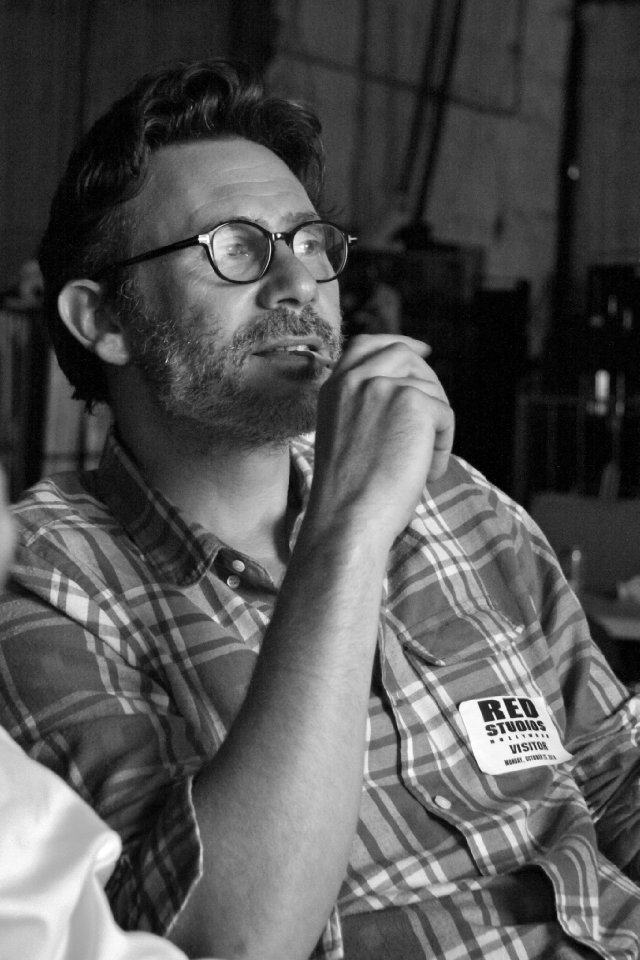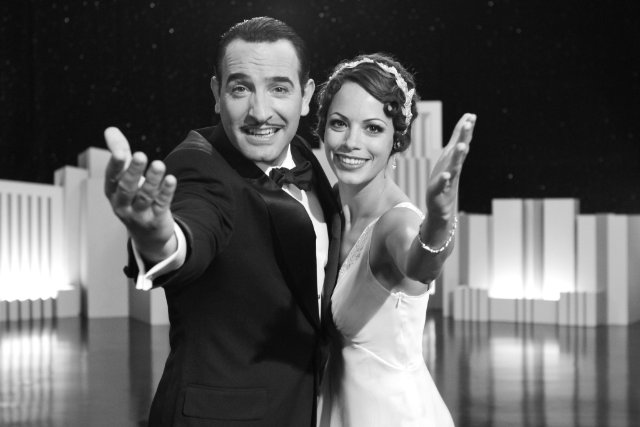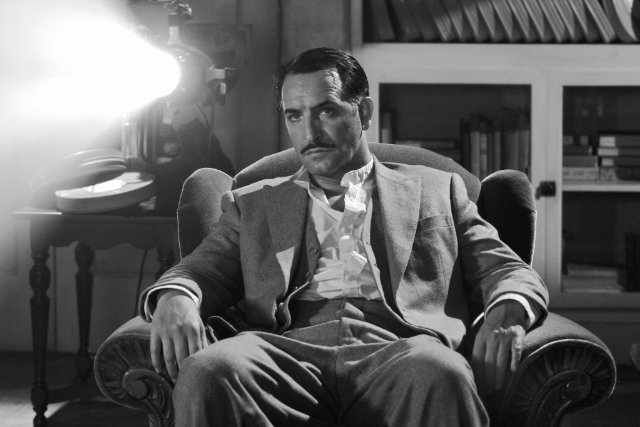Wily
provocateur and indie screen mogul Harvey Weinstein sees beyond the
obvious and recognizes value in some rather offbeat films.
Thankfully, that support has so far paid off. Four of Weinstein's
pictures won awards at this year's Golden Globes, with a bloc going
to one of 2011's most unusual films – The Artist.
In making
The Artist a black & white, silent movie, French director Michel
Hazanavicius defied expectations. For anyone else, this would be not
only a strange concept, but a retrogressive idea, simply a throwback
to another era. Yet this veteran French filmmaker employed a
sufficient sense of irony to take the idea beyond preciousness and
imbue it with a wit and charm that makes it feel both classic and
contemporary.
The director
works from an eternal scenario. In 1927 Hollywood, the arrival of
talking pictures creates turmoil for silent film star George
Valentin (Jean Dujardin) who fades into oblivion as he resists the
change.
Meanwhile,
Peppy Miller (Bérénice Bejo), a young dancer who becomes gets a big
break by meeting Valentin, shifts into stardom by embracing the
talkies while George sees a reversal of fortunes. As he slips into
near-poverty, George and his dog Jack (Uggie) stay true to each
other as everyone else moves on – except Peppy, who, in the end,
offers him a chance to redeem himself and share the spotlight with
her.
And now that
the film has been nominated for 10 Oscar noms, the film racks even
more attention as a cautionary tale: adapt to new technology or get
left behind.
 The
following Q&A with director Hazanavicius is excerpted from an
exclusive roundtable held before The Artist's American debut at the
2011 New York Film Festival.
The
following Q&A with director Hazanavicius is excerpted from an
exclusive roundtable held before The Artist's American debut at the
2011 New York Film Festival.
Even before
the pitch, why did you think you could do this and that we would
want to see it?
You never
know, actually. You can't be sure. I said to the producer, "First, I
have to write the script, and I'll know after that if the movie's
doable or not." In writing the script, I had to find all the
solutions of how to direct a silent movie, and what you're going to
ask of the actors and what you're going to ask of the director. In
this case, [the director is] myself, but, in a way, it's
pre-directing the movie. I had this exit in a way, and if the script
was not convincing, we would never do the movie. Everybody tells you
that nobody wants to see a silent movie. That nobody wants to see a
black & white movie. People think that black & white, silent movies
are old, and they're right. But they're old because they were been
done in the 1920s, not because of the format. The format is really
good. I had the hunch that the format would allow me to do a very
specific movie. You just have the hunch that there's a good movie to
do. If you do a script with the normal paper and letters like this,
when people read a script, they just read the dialogue. They never
read the action, except maybe for action movies. It was really just
action here, and over three pages you have just one card. So we
tried to do a nice object, and that's what we did. We did an object
that respected the ratios. It was a square paper, old paper, like a
little bit yellow, typewriter letters, a little bit bigger. That
makes people think that it was easy to read because they turn pages
often, more often than like this. We put a lot of pictures, photos
in the script. It was the producer's idea and I think it was a
really good idea.
The script
will be a collector's item...
Yes.
How long
did it take you to storyboard it?
The script
was, strangely, very fast to write – four months, which for me is
very fast, and especially because I spent a lot of time watching
movies. Usually it takes me six or eight months, and it's not the
dialogue that takes me four months, it's very easy to make the
dialogue. The storyboards, I don't know. I drew [them] myself, so I
would say three weeks or maybe a month. But it's during the
preparation, so I don't do just that. I work on the storyboard the
morning and the evening and then do other things.
 How
did you cast Dujardin and Bejo?
How
did you cast Dujardin and Bejo?
I wrote the
script with them in mind. I wanted to see them as actors in that
kind of story, in that kind of element. They have ageless faces, and
are really credible in period movies. They don't have modern faces.
When you put a costume on an actor that helps a lot. [Actors] don't
move the same way [in a costume]. The other actors, the American
cast, I found with casting director Heidi Levitt, who was really
great; we tried to work with some expressive actors because there
are a lot of great ones. When an actor like John Goodman (who plays
the studio mogul, Al Zimmer) says something, all of his body and
face express what he's saying, so I had to work with that kind of
actor. I've been very lucky that a lot of great actors joined us on
that movie.
Was Uggie
the dog – playing one of the film's best actors – always part of it?
He was in the
story from the very, very beginning, in the movie before Hollywood.
Hollywood came after the dog. I didn't realize exactly how important
he was at the very beginning, but now when you do the promotion of
the movie, you talk and talk, and in talking, you realize things
that you've done and you have another understanding of your work. I
realized that that dog is very important for two reasons. The first
one is the character – it changed the main character. When you
create a character, you don't just create one character, you are
helped with the other ones. They put another light on the character.
The character of George Valentin is not very sympathetic; he's very
egocentric, selfish, and he's very proud. He started the movie with
a woman and he finished with another woman. But the fact that he has
a dog who loves him and follows him all over the movie, in a way, it
saves him because you trust the dog. You think that the dog knows,
that he has instincts, so if the dog loves him, somewhere he's a
good person. The other thing is, this dog is the only friend of
George. George has a problem with sound, with the talkies, and his
only friend is a character that doesn't speak either because he's a
dog. So yeah, he's very important. You think he's a good actor but
he's not. He's a dog. He doesn't act, he doesn't read the script, he
doesn't care about the situation, he doesn't care about his
partners. He just cares about sausages. That's what he wants for
real.
 The
Artist
was shot in only 35 days. What did it take to make a film in such a
short time?
The
Artist
was shot in only 35 days. What did it take to make a film in such a
short time?
It's as if you
tried to paint the Mona Lisa on a roller coaster – it's crazy. You
have to go very fast. The preparation of the movie is really, really
important. We always speak of the shooting, sometimes the editing,
sometimes the writing. But the preparation – you [make] all your
mistakes in shooting through the preparation, so the more you
prepare, the [easier] the shooting is. That's why I storyboarded
everything. We worked very quickly. It was not so difficult to edit
because the movie was really well prepared and I didn't do a lot of
takes because I had to go fast.
How many
days did you spend editing it?
I don't
remember exactly, maybe 14 or 15 weeks. It wasn’t huge. For the last
one, I had 22 weeks. I don't remember exactly. I watched a lot of
silent movies for the writing and preparation but the most difficult
thing was not so much the editing, it was the composing of the music
because the music is really important in the process. It gives you
the emotional track of the story, and if there's any confusion, any
nonsense in the music you pay [for] it very immediately. Sometimes
the music they put in these old movies is really ridiculous. You
really can see when you look at [it], not as an audience but as a
director, that the music doesn't fit and really doesn't help the
story. [My] composer, Ludovic Bource, had to do his own music, yet
respect the references that I gave him [like] the old Hollywood
classical composer. But [he also had to] respect the story and the
precise structure I gave him. When you edit a movie the problem is
the structure. The turning point, the conflict point, although it's
the same, the timing always changes. [Anne-Sophie Bion, who worked
with me on editing, understood what we had to work with.] [When] you
start editing, it's like two hours and five minutes; then you go to
one hour 40 minutes. And he had to adapt his music so it's always
moving. He did a really great, great job.
For more
stories by Brad Balfour go to:
filmfestivaltraveler.com
Email
us Let us know what you
think.